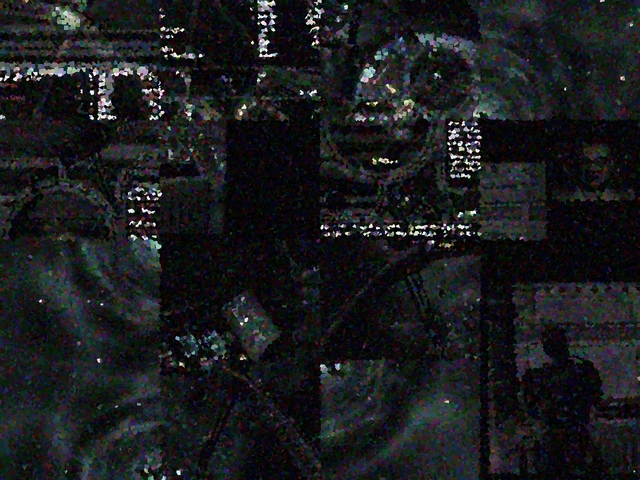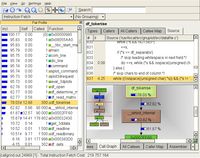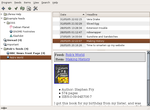Computers Archives
05 December 2006
New Computer
 After a
slightly reckless late-nate ebay purchase, I'm now the proud owner
of a new computer. It cost me 150 quid, which I suppose is a pretty
good price.
After a
slightly reckless late-nate ebay purchase, I'm now the proud owner
of a new computer. It cost me 150 quid, which I suppose is a pretty
good price.
The main reason for the purchase was to get something quieter and less power-hungry that I don't feel guilty about leaving on all the time.
Specs:
- 1 GHz Nehemiah C3
- 512mb RAM (incl. shared graphics)
- 100Gb hard drive (acquired from the long defunct penrah)
- DVD-ROM
- runs off 12v (60w) external power supply
As I gave it penrah's hard drive, it has effectively become
penrah. I think a new name is in order though (penrah was assigned
by UoN, so I don't have
much attachment to it). Any suggestions? Previous computer names
are Shakespeare,
Euclid and
Möbius.
29 November 2006
Memes
meme
n : a cultural unit (an idea or value or pattern of behavior)
that is passed from one generation to another by
nongenetic means (as by imitation); "memes are the
cultrual counterpart of genes"
but in reality tends to take the form of a link to a vaguely
amusing web-site, often hosting some kind of quiz or test. The
spread of a meme through the blogosphere can often be very rapid. I
tend to come across them on planet.debian.org. There is
certainly no element of passing from generation to generation!
Some guy is attempting to measure this wildfire phenomena by encouraging people to link to his article on the subject. Join in if you like!
21 September 2006
OSM wallpaper
One thing that has fascinated me though is the little thumbnails the project generates for each trace uploaded to their website. These take various different forms depending on the type of journey being undertaken. I thought it would be fun to make some desktop wallpaper out of them. The standard colour-scheme is black on white but I imagine some people will prefer white on black.
I guess because the images use OSM data they are licensed under
a CC BY-SA license. 
Let me know what you think. I'm sure a bit more creativity wouldn't go amiss....
Automatical Solitaire playing program
To use it, launch Solitaire (it works with both the W2K and WXP versions of Solitaire, although currently it only does "deal one" and it can't cope with the Astronaut deck (because it doesn't have a black border)). Then press "Step" and it will play a single move, or "Run" and it will play for a maximum of 200 moves, or until it Resigns (after dealing 20 cards in a row with nothing else to do).
When it has finished, it will show a textual version of the game layout, and a log of the moves it made. In the text grid, C, D, H, S, stand for the four suits (Clubs, Diamonds, Hearts, and Spades respectively), R and B stand for unknown red or unknown black, and X, J, Q, and K, for 10, jack, queen, king, and so on. It isn't brilliant at detecting the suit of a card, but it doesn't (yet) use anything other than the colour and rank to work out moves.
Currently it plays using some fairly simple rules, so it will sometimes give up on winnable games. When it does win, it tends to complete the game in around 2 seconds, (Watching it play makes me ill, because the cards flicker around so much) however under the standard scoring scheme, the maximum bonus you can get is to complete in 30s (bonus = 700000/time if time >= 30). This gives a highscore of around 23833 (assuming 500 non-bonus points).
There are plent of bugs. e.g. It doesn't yet notice when it's won.
12 April 2006
New home
The new home has some advantages over the university hosting — statistics, php, cgi (and shell access to the cgi servers). Main downside is that I can't rsync the pages or ssh to the actual web server. I'm tempted to host the entire site on the cgi servers, but that would seem to be taking liberties.
The existing site will remain active for some time I guess.
UPDATE:
lftp seems to be able to fit the "rsync over ftp" gap. Obviously not as efficient, but does good enough for my needs. Also I'm interested in ideas for a better name/url for my site. Needs to be a bit more professional than "bath terror" or "brother rat"...02 November 2005
Spam, spam, glorious spam
23 October 2005
Just for fun
As /var would occasionally fill up (especially during large apt-get dist-upgrades) it seemed logical to extend /var to cover all that free space. However, I didn't want to disrupt my 202 day uptime record in the process did I?
Also just to add a bit of spice to it, I decide to perform this "slight tweak" from home over ssh (and a wireless link for that matter -- what was I thinking!!)
Amazingly it turned out to be surprisingly easy:
- Close down programs using /var: This was virtually every service on the box, samba, cron, inetd, apache, ntp, and so on. Did require a bit of lsof | grep /var combined with some head scratching.
- umount /var and /usr/local (which was the only partition after /var and the defunct /home and would get a new number once the change was complete) and /usr/local/share/music (for obvious reasons)
- Use parted to resize the partition. Unfortunately parted thinks my /var partition has an unusual layout and refused to resize it. I therefore took careful note of the start and end sectors and deleted it and the old /home and created a new partition that started at the same place. The kernel even reread the partition table (bear in mind /, /usr and /home are all earlier on the same disk)
- edited /etc/fstab to reflect the new partition numbers. I suspect disk labels or such like would make this easier, but this box was installed four years ago now, and I don't think that was how things worked in those days.
- used ext2resize to grow /var to fill the new partition.
- fsck /var just to be sure. Actually the most time consuming part of the process.
- remount and restart everything I'd stopped. (except for all those things I didn't really need)
Filesystem Size Used Avail Use% Mounted on /dev/hdb5 958M 364M 546M 40% / /dev/hdb7 7.6G 5.7G 1.6G 79% /usr /dev/hdb1 28G 13G 14G 48% /home /dev/hdb9 13G 2.4G 9.2G 21% /var /dev/hdb8 63G 57G 2.8G 96% /usr/local /dev/hda5 29G 26G 1.2G 96% /usr/local/share/music /dev/hda1 9.8G 6.5G 3.4G 67% /mnt/windows tmpfs 633M 4.0K 633M 1% /dev/shm none 10M 2.6M 7.5M 26% /dev //wenacl1/enxrah 95G 93G 1.8G 99% /mnt/wenacl1 //wenacl2/enxrah 95G 90G 4.6G 96% /mnt/wenacl2Most of /usr/local is symlinked into /home/enxrah so I guess the situation still isn't perfect, but it'll do.
17 October 2005
KDE vs. GNOME

 I got it into
my head a week or two ago that I wanted to give KDE a proper try.
I've long been dismissive of KDE for various reasons: QT was
non-free, KDE was not part of Debian, it didn't look very pretty
when I last tried it (for all of 5 minutes), its applications are
slow to start and bloated with configuration options. That sort of
thing.
I got it into
my head a week or two ago that I wanted to give KDE a proper try.
I've long been dismissive of KDE for various reasons: QT was
non-free, KDE was not part of Debian, it didn't look very pretty
when I last tried it (for all of 5 minutes), its applications are
slow to start and bloated with configuration options. That sort of
thing.
As a long time GNOME user (5 years I reckon) I've been reasonably happy with it, but recently I've been becoming aware of some of its deficiencies, and given that free software is about "freedom" rather than blind faith, figured it would be good to get an proper understanding of what the other side has to offer.
- First impressions — to be honest I was a little overwhelmed. The first thing I needed to do was configure a few things so that they suit me. For anybody used to GNOME, the KDE Control Centre is like a very bad dream - it actually needs a special "search" facility to let you find the options you want to change! It does however have all those options that you wish they hadn't got rid of in GNOME.
- Applications — so far I've really used three: juk (in
place of Rhythmbox), akregator (in place of liferea) and konqueror
(in place of firefox). The are other programs for which I couldn't
find a direct replacement (e.g. gaim) or for which I'm less keen to
jump in at the deep end with (i.e. evolution) but these seem to run
adequately within the KDE setup.
- Juk: I like juk a lot. It does everything Rhythmbox does and all those things that I want that Rhythmbox doesn't do: displays a pop up on track change; it has a jukebox style of operation (i.e. play through this list of tracks, which I might be adding to, but then revert to random play of the whole collection); and it does something reasonably sane with album art (just a shame it doesn't have an option to look for jpeg files in the same folder as the mp3s!)
- akregator: I'd be hard pressed to notice the difference between this an liferea. It was a simple matter of importing my liferea feed list, and it's basically `just worked' ever since. I think it displays the html better than the gtkhtml backend for liferea, and the viewer is better integrated than the mozilla backend. I do slightly miss the virtual folder support, but it was never that great anyway.
- konqueror: The nice thing about konqueror is that it is better integrated than firefox is (but that's obvious because firefox isn't a gnome application). Haven't really had time to delve into it much. I will need to work out how to import (and preferably sync) my bookmarks and how to enable type-ahead find, which I don't see how anybody can live without.
- Overall — I intended to run the trial for one week, and fully expected to be switching back to my beloved GNOME at the end. As it turns out, it's been a lot longer than a week since I started this experience, and although I wouldn't say I'm hooked, I am finding myself growing used to KDE. I installed it at work (just to get juk) but whenever I next get around to logging out (according to w my gnome-session has been around for nearly two month!) I will probably give KDE a go there as well.
Well, that's it for now. I may post an update at some point.
04 October 2005
uptime
This beats my previous record of 180 days, and unlike that time, there are no pressing reasons for a powercycle anytime soon. (In the last four years I've moved office on three occasions, and the power to the building has been cut at least 3 times)$ uptime 11:26:33 up 182 days, 18:56, 14 users, load average: 1.99, 1.85, 1.29
$ ud -d One : 182 day(s), 18:56:20 running Linux 2.6.11.6, ended Tue Oct 4 11:25:57 2005 Two : 180 day(s), 18:00:11 running Linux 2.6.0-test1, ended Wed Jan 21 16:36:17 2004 Three: 170 day(s), 00:11:45 running Linux 2.4.18, ended Fri Aug 16 13:16:00 2002
07 September 2005
Image reconstruction

This is my attempt to solve the LGP competition where an extra pixel is revealed in this image every second.
I'm not sure what it is. It appears to be a 4x4 grid of sub-images that I haven't worked out exactly how to rearrange, but there are various things that looks sort of "space flight-ish" could be my imagination tho.
10 June 2005
penrah gets cracked
I discovered that my work computer (known cryptically as penrah) had been broken in to by a cracker coming from a Romanian ISP.
The situation was partly my fault. I had sometime ago created an account to allow my brother to ftp some large files to me, and left it with an insecure password. The intruder was in the process of scanning for further vulnerable accounts, and setting up an IRC bot of some kind. I think they would have been thwarted by the university firewall, and I discovered the intrusion pretty quick.
The moral of the story is never ever choose easy passwords.
10 June 2005
kcachegrind

Had a little bit of fun optimising gnuplot for reading large
matrices of numbers. To cut a long story short, the existing code
uses sscanf() which turns out to be up to ten times
slower than strtod(). The whole situation is made IMHO
overly complex due to the need to support a wide range of legacy
platforms, and the unusual (by ANSI C standards) number formats of
FORTRAN. I
think I saw an article on slashdot not so long ago, that seemed to
think that sort of thing will be the death of free software.
In the process of doing all this, I discovered kcachegrind which is a graphical utility for examining the call profile of an application. This made it incredibly easy to narrow the hotspot down to a single line of code in gnuplot.
02 June 2005
liferea
 For a
while recently, I've been aware of the number of sites that now
provide RSS
feeds. Since starting this site, I've become all the more aware of
the phenomenon, and wanting to get onboard. Today's LWN had a bit of a roundup of
linux RSS aggregators, so I've apt-get install liferea and
am giving it a go.
For a
while recently, I've been aware of the number of sites that now
provide RSS
feeds. Since starting this site, I've become all the more aware of
the phenomenon, and wanting to get onboard. Today's LWN had a bit of a roundup of
linux RSS aggregators, so I've apt-get install liferea and
am giving it a go.28 May 2005
ndiswrapper
The problem turned out to be something to do with some kind of mismatch between the kernel module and the userland utils, although the error message was completely cryptic (as usual). Thankfully I happened to have the source code for the debian packages lying around, so I avoided the usual Catch-22 with getting network drivers.
Thu May 26 20:16:26 BST 2005
Time to smarten up my website
we shall see....